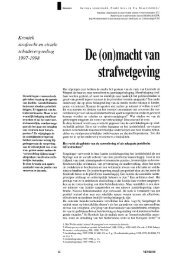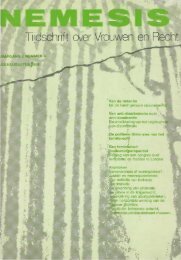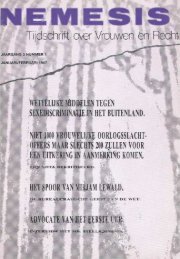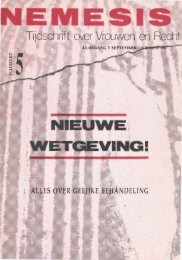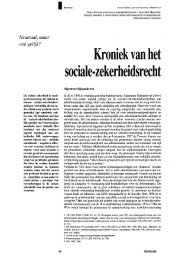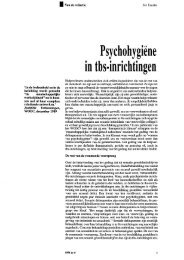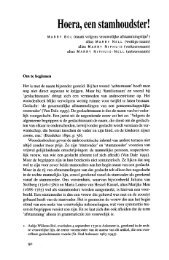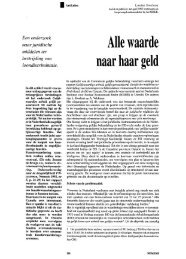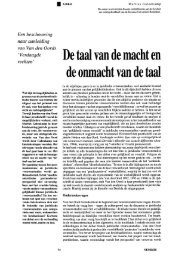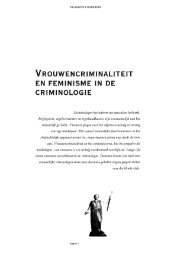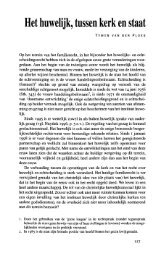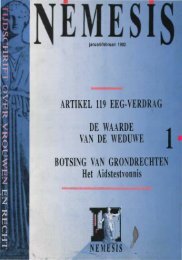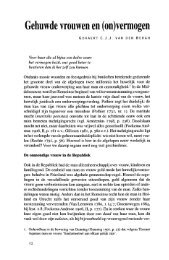(2003) nummer 3 mei/juni - Nemesis
(2003) nummer 3 mei/juni - Nemesis
(2003) nummer 3 mei/juni - Nemesis
You also want an ePaper? Increase the reach of your titles
YUMPU automatically turns print PDFs into web optimized ePapers that Google loves.
was sentenced to seven months' imprisonment<br />
on probation.<br />
In establishing the relevant facts, the<br />
court relied on the statements made by<br />
the mother concerning her daughter's<br />
account of the relevant events, her behaviour<br />
after the music lesson on 29<br />
April 1993 and her character in general,<br />
and also on the evidence given by<br />
the police officer who had questioned<br />
S. shortly after the offence in April<br />
1993.<br />
The court dismissed the applicant's request<br />
for a psychological expert opinion<br />
regarding the credibility of S.'s<br />
statements on the ground of the court's<br />
own professional experience, acquired<br />
as a judge in family matters, in evaluating<br />
statements made by children.<br />
Moreover, the court observed that it<br />
had not been reasonable to hear S. herself,<br />
as, according to her mother, she<br />
had meanwhile repressed her recollection<br />
of the event in question and would<br />
seriously suffer if reminded thereof. If<br />
S. were to be examined, this would not<br />
contribute to a further clarification of<br />
the facts, but seriously impair her personal<br />
development.<br />
10. The applicant appealed to the Heilbronn<br />
Regional Court, requesting his<br />
acquittal. In the appeal proceedings, he<br />
was assisted by counsel.<br />
11. On 17 March 1995 the Heilbronn<br />
Regional Court dismissed the applicant's<br />
appeal against his conviction of<br />
sexual abuse of a child, but set aside the<br />
conviction of sexual abuse of a charge.<br />
The sentence to seven months' imprisonment<br />
on probation was upheld.<br />
The Regional Court noted that the applicant<br />
had denied having sexually<br />
abused S. It found that his guilt could<br />
be established on the basis of the evidence<br />
before it, i.e. the statements<br />
made by S.'s mother and the police officer<br />
as well as a psychological expert<br />
opinion on the question of S.'s credibility,<br />
ordered in the context of the appeal<br />
proceedings. In her report of November<br />
1994, the expert, who had<br />
questioned S. in October 1994, confirmed<br />
that S.'s statements were credible.<br />
The Regional Court considered that the<br />
absence of S.'s testimony in court constituted<br />
a serious shortcoming in the<br />
taking of evidence. In this respect, it<br />
noted that the parents had refused to<br />
bring their daughter to court on account<br />
of the risk that her state of health would<br />
deteriorate as she suffered from neurodermatitis.<br />
According to the Regional<br />
Court, the parents' refusal was understandable.<br />
In this respect, the Regional<br />
RECHTSPRAAK<br />
Court had regard to a medical certificate<br />
confirming the parents' statements<br />
and the findings of the psychological<br />
expert that S.'s state of health would<br />
most likely deteriorate again if she<br />
were to be heard anew on the event in<br />
question. Taking into account that S.'s<br />
statements had been reported by her<br />
mother and by the police officer and<br />
that an expert opinion on her credibility<br />
had been prepared, the Regional<br />
Court, considering the rather trivial nature<br />
of the charge and the sentence at<br />
stake, reached the conclusion that S.<br />
was to be regarded as a witness out of<br />
reach.<br />
12. On 2 August 1995 the Stuttgart<br />
Court of Appeal dismissed the applicant'<br />
s appeal on points of law.<br />
13. On 18 January 1996 the Federal<br />
Constitutional Court refused to entertain<br />
the applicant's constitutional complaint,<br />
leaving open the question<br />
whether the complaint had been lodged<br />
in time.<br />
II. Relevant domestic law<br />
14. The conduct of trial proceedings is<br />
governed by sections 226 to 275 of the<br />
Code of Criminal Procedure (Strafprozessordnung).<br />
15. As regards the taking of evidence,<br />
section 244(2) provides that the court<br />
shall, proprio motu, extend the taking<br />
of evidence to all facts and evidence<br />
important for the decision in order to<br />
determine the truth.<br />
A request for the taking of evidence<br />
may be refused under the statutory conditions<br />
of section 244(3) to (6). Pursuant<br />
to section 244(3), second sentence,<br />
an application may, interalïa, be<br />
refused if the evidence is unavailable.<br />
THE LAW<br />
I. Alleged violation of article 6 of the<br />
convention<br />
16. The applicant complained that he<br />
could not put questions to the child S.,<br />
the main prosecution witness. He invoked<br />
Article 6 3 (d) of the Convention<br />
according to which<br />
'3. Everyone charged with a criminal<br />
offence has the following minimum<br />
rights:<br />
(d) to examine or have examined witnesses<br />
against him and to obtain the attendance<br />
and examination of witnesses<br />
on his behalf under the same conditions<br />
as witnesses against him;'<br />
17. The applicant considered that questioning<br />
S. in court would have been important<br />
for establishing the truth.<br />
18. The respondent Government maintained<br />
that in the overall circumstances<br />
the requirements of a fair hearing were<br />
met. In particular, the courts used statements,<br />
made by the mother and by the<br />
police officer conducting the criminal<br />
investigation, on the events of 29 April<br />
1993, and also the mother's statements<br />
as a witness to the child' s agitated state.<br />
The decision not to interrogate the child<br />
in court was based on the fear of damage<br />
to her health as a result of emotional<br />
stress, as indicated in a medical certificate.<br />
Moreover, the Regional Court<br />
had regard to an expert' s opinion on her<br />
psychological examination of the child.<br />
The applicant had sufficient opportunity<br />
to comment on these statements and<br />
did not, in the appeal proceedings, request<br />
that the child be interrogated in<br />
court. According to the Government,<br />
the child did not have to be examined<br />
by a psychological expert at the earliest<br />
possible stage of the proceedings.<br />
19. The Court recalls that the admissibility<br />
of evidence is primarily a matter<br />
for regulation by national law and that<br />
as a general rule it is for the national<br />
courts to assess the evidence before<br />
them. The Court's task under the Convention<br />
is not to give a ruling on<br />
whether statements of witnesses were<br />
properly admitted as evidence, but<br />
rather to ascertain whether the proceedings<br />
as a whole, including the way in<br />
which evidence was taken, were fair<br />
(see the Doorson v. the Netherlands<br />
judgment of 26 March 1996, Reports<br />
1996-11, p. 470, 67; and the Van<br />
Mechelen and Others v. the Netherlands<br />
judgment of 23 April 1997, Reports<br />
1997-III, p. 711, 50).<br />
20. This being the basic issue, and also<br />
because the guarantees in paragraph 3<br />
of Article 6 are specific aspects of the<br />
right to a fair trial set forth in paragraph<br />
1 (see, amongst many other authorities,<br />
the Van Mechelen and Others judgment<br />
cited above, p. 711, 49), the<br />
Court will consider the applicant's<br />
complaints from the angle of paragraphs<br />
3 (d) 'and 1 taken together.<br />
21. All the evidence must normally be<br />
produced at a public hearing, in the<br />
presence of the accused, with a view to<br />
adversarial argument. There are exceptions<br />
to this principle, but they must not<br />
infringe the rights of the defence. As a<br />
general rule, the accused must be given<br />
an adequate and proper opportunity to<br />
challenge and question a witness<br />
against him, either when he makes his<br />
statement or at a later stage (see the<br />
Van Mechelen and Others judgment<br />
cited above, p. 711, 51; and the Lüdi v.<br />
Switzerland judgment of 15 June 1992,<br />
Series A no. 238, p. 21, 49).<br />
NEMESIS <strong>2003</strong> nr. 3 15



